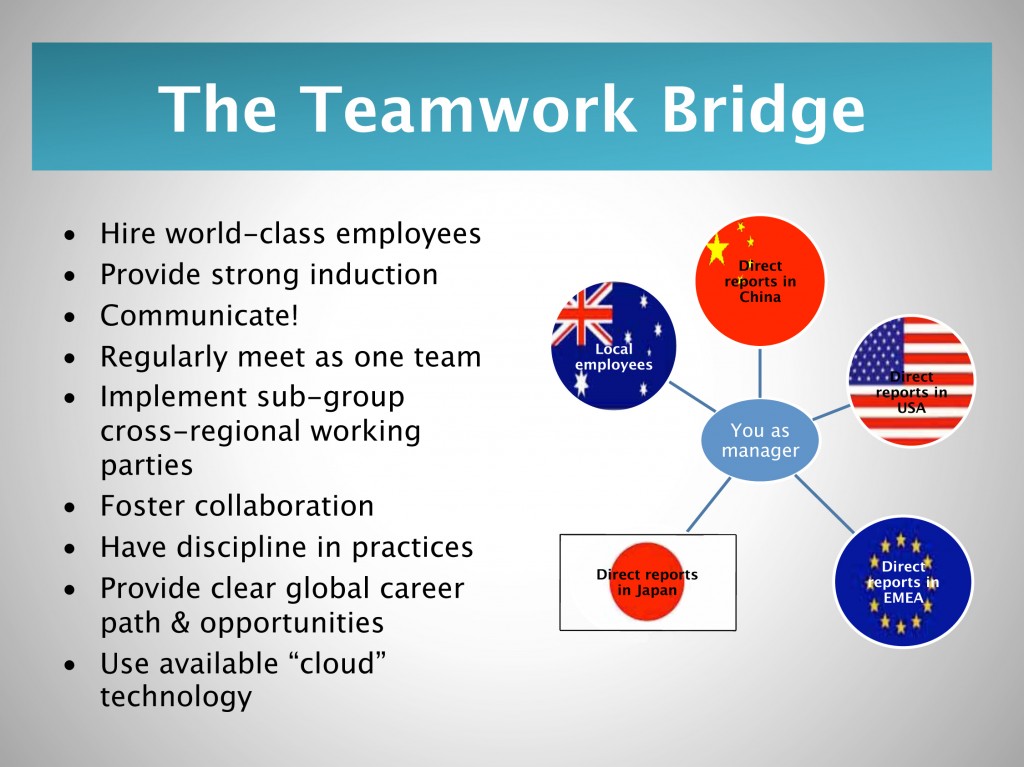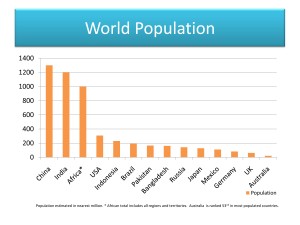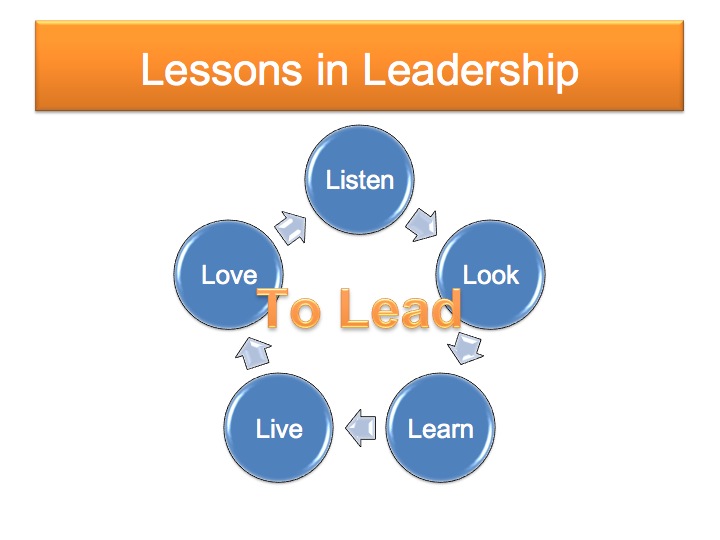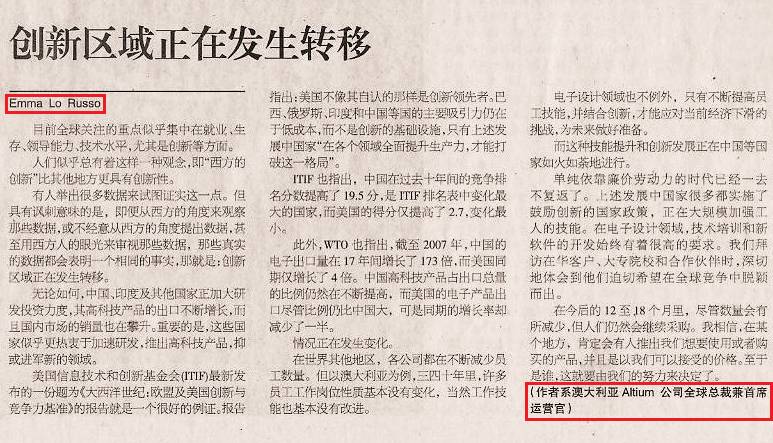As the world increasingly becomes globalized and technology makes it easy for us to work remotely, you may increasingly find yourself in a situation where you need to manage a virtual team.
Having worked for an Australian listed company where 97% of its revenues were offshore, the workforce as a consequence was split to nearly two-thirds in remote offices resulting in many direct reports crossing multiple regions. Even within head office, in order to attract and retain the best talent, we needed to provide flexibility around balancing work hours with personal life. This meant a percentage of local employees also chose to work from home offices in various percentages of their working week.
So how do you manage your remote employees, particularly those that are working in multiple global regions and ensure that the vision for your company is well understood, that the objectives and timeframes are clear, that the culture is being lived, that they are motivated, energized, feeling part of a team?
This article is designed to share the best tips and practices learned over 5 years of leading a global organization, and addresses how you can achieve a unified work force where employees feel connected and as one team – no matter where they are located.

1. Set strong foundations – hire world-class employees
This is a critical business success factor. You need to feel confident you have the right person to represent and lead your company, can evangelize the culture, live the values and be able to make decisions every day that is in harmony with, and will deliver on, your overall business objectives.
There is no doubt, the stronger the person you have, the greater the success you will see as they are able to make judgment on how best to localize the strategies to achieve the broader objectives within their specific market or region.
The more capable and competent the person, the more possibility you have for cross border promotion and the building of a greater organization. So don’t ever compromise on recruitment, with the stakes being higher for those representing you in overseas regions and outside of regular view and contact. You need to have full confidence you have someone you can trust in the job. Great business success depends upon top talent.
2. Importance of Induction
Again another critical business success foundation factor. Often in the speed to implement new plans, not enough time is spent on providing a comprehensive induction program for your new employees. It is important that an induction program extends beyond the immediate first weeks or handover of duties. Consideration and time must be given to discussion of values and of culture, plus discussion of previous successes and failures and why they went right or wrong (this is to encourage learning and comfort in discussing the good and challenging times of the business or the role).
Other induction strategies like shadowing in meetings to help share the company language, best stories and best practices can help provide confidence. Initially you or others may lead, however as soon as you feel confident, it is important to switch roles and shadow and coach with your employee leading until you are confident they are fine to stand alone. The main requirement to have confidence in managing this person remotely is for you to ensure you establish a solid relationship and equip your employee with enough information, enough experience, enough confidence very early on in the appointment to be able to confidently represent the company.
See the induction period as a minimum of 6 months and provide close contact and encouragement to ask questions. If this is an appointment in a different region, an example schedule may be:
- Solid briefing them through the recruitment process already providing a strong foundation and qualifying tasks around understanding of the products, markets, competitors etc
- A fortnight induction with you at HQ – allow them to see and hear first-hand how the company operates, allow them to meet their other stakeholders, key customers etc
- Assign a work buddy that you trust can also help evangelize the values and culture
- Once they are “live” ensure close contact with you & encourage them to really share first insights and ideas (this is a great way to discover objective new insights)
- Ensure they are equipped with everything they need – resources, budgets, etc
- Visit them regularly in the first 6 months but offer practical & philosophical help – e.g. visit their customers, partners, media, present jointly to their team or answer Q&As
- Request after 3 months a revised high-level plan. This will ensure you get a good understanding of how deep their understanding is and any areas that you may still need to help them with. Look to have them present to others early in the engagement to help formalize the shared learnings. Encourage questions around feedback.
- Get the team together within that period to ensure relationships are built at the team level even if they are all working remotely away from each other.
It is important not to micromanage the person – this is just a period of foundation setting around the “what” and the “who”, and unless the “how” is important then allow that to be determined by your employee. As soon as you think they are ready you need to give them enough space to do what you first employed them to do!!
Although this point addresses induction, the need to stay engaged as part of developing the individual overall is required.
3. Importance of frequent & open Communication
Be frequent, regular, consistent and coherent in your communications. Help your remote employees feel part of what is going on in your organization through regular:
- Phone calls
- Chats (instant messaging, Skype and others)
- Video hook ups
- Wikis, forums, blogs and other web dashboard “single views” for all employees
- Engage others in your team to inform/provide briefs to your remote employees – just as long as someone is sharing what is going on!
- Share drafts of communications, plans, pending decisions and presentations for input
- Localize communications if there are language barriers
- Make regular face to face time – even if they are overseas, coordinate at least a quarterly face to face meeting (you to them or they to you)
- Regular face to team meetings
- Email helps provide background and can be used to help overcome the tyranny of different working time zones, but don’t rely on this as the only means of communication
If you have followed step one and you have smart people, they generally will be very good to pick up on what is or is not happening within your business. However it is important you do not leave them guessing and trying to fill in gaps that can lead to wrong conclusions. Instead include them in sharing the ups and downs, the challenges you or the organization are facing etc, in order for them to have the opportunity to input and help. Apart from the relationship building upon honesty and transparency, a benefit is that they can help either solve or at least understand what else is happening in the business which may be possibly impacting them or others they are dealing with.
4. Regular team meetings
Feels like it is stating the obvious right? But with remote employees you need to make sure that they not only have their time with you, but that they have time feeling part of the team, both to build their understanding of each others’ styles, challenges, and dependencies, but also to help provide a forum to share key learning, insights, projects, achievements that they are working on. It is a good way for the team to identify where and how to help each other successfully meet the business objectives. It is also essential to build and retain the values, character and culture of your organization. When you are in the position of managing your people over multiple time zones, you need to agree to the appropriate frequency and ensure these virtual meetings always occur.
If you are managing a global team, remember to change time zones for calls to suit the different employees (be fair and schedule this accordingly). There will always be someone who will be up in the middle of the night – just make sure it is not always the same person! And include yourself in the schedule of middle of the night calls. Make sure you give plenty of time and priority in team meetings to those not immediately in front of you and who do not have the benefit of the pre or post discussions that can follow a meeting.
5. Identify the sub group working parties – and create cross-functional teams and ownership across borders
This is a practical tip to ensure you don’t focus too much on the doing yourself or within your headquarters team only. Spread and share your projects and create cross-function teams and ownership of certain objectives within a sub-set of virtual teams across borders. The creation of these virtual teams helps you utilize all your available talent but also ensures a strong culture of collaboration, teamwork and global awareness and understanding of the entire business.
6. Foster collaboration
Every point within this article is about fostering collaboration, but it is also a topic worthy of its own highlighted focus and attention. Ask yourself these questions: What example do you provide in collaborating with your team? How can you create an environment of collaboration and do this through remote employees? How do you encourage problem solving? Provide cross-regional resources? Virtual teams? Use this point more as a prompt to continually ask yourself how you can foster collaboration within your team. For remote employees this is critical to ensure high motivation, engagement, loyalty, commitment and for your culture to live and breathe in the way you would hope it could.
7. Discipline in practices
This is just good business practice and as a manager and leader of remote employees it is important you keep discipline in how you apply this to different time zones, regions and needs. From personal experience, it can be quite taxing: to be available first up in a morning for say the US, to be available for APAC in the day and then the EMEA during the evening. If you want to keep a work/life balance then you will need to have discipline around planning the how and when to do all the things you need to do.
It is important that you build in time for:
- Acknowledgement of employees work, give feedback in the timeframes that you commit to, give them some structure so they have good expectations to rely and operate within.
- Provide available times or implement a system where they can let you know when they need to touch base outside of scheduled times. This should help you instead of being “on-call” 24/7 to everyone
- Share and acknowledge successes, their milestones and achievements of your direct reports and those of their team
- Provide regular performance and development feedback, make time for personal and professional development discussions and formal acknowledgement of performance reviews
8. Provide a clear career path – circulate employees across offices.
If you want to hire world class/world’s best talent you need to be able to demonstrate a great career path. Working for a global or virtual organization provides many great benefits and interest to employees and you hopefully you have already made sure you have hired those with enough ambition to deliver great results as the path to the next step. Ensure you have an individual development and career plan in place and look at what would be involved in delivering this from an investment and career path perspective.
It is important to ensure the movement of your people is two-way. Don’t just handpick the best talent from external offices and bring them to head office. Plan for senior organization leaders or future leaders to spend time out of headquarters within the various regions. This helps cement culture and brings a deeper level of understanding of your business in all regions and areas of your business that can bring not only immediate benefits, but also long term ones.
9. Harnessing available technology
There is much technology available to help you work remotely and stay connected with each other. Using cloud-based technologies like Gmail & Google docs for real time collaboration no matter where you are located can help. As does SaaS programs such as SalesForce for your customer relationship and data management purposes, and Intaact for Financial systems, ensuring everyone has access to the same information and infrastructure in real time no matter where they operate. Other technologies such as VOIP e.g. Skype can help keep costs low but frequency of contact and virtual face to face visibility high. Whilst Skype is good for one on one meetings, if you can’t afford internal video conferencing facilities for group meetings, you can hire out venues that provide it for you.
As to your IT server requirements, there are plenty of hosting services that allow you to store and retrieve any amount of data, at any time, with highly scalable, reliable, fast and inexpensive hosting from providers such as Amazon S3.
There is a plethora of virtual on-demand solutions that can help you manage your business no matter where your employees are located. This enables you to focus on your core business, leaving the business of managing the IT to those who specialize in it as well as providing you with flexibility and scalability that is difficult to compete with if you choose to keep your entire infrastructure in-house.
Building a strong and collaborative team
As a business leader you must have set firmly an overall organization development strategy that includes the objective of building a strong and collaborative team.
These tips are all about creating a team bridge – a way to help your remote employees feel connected. Connected and engaged employees are more likely to be motivated and will deliver much more than if they are left alone.
As Jack Welch best summarizes it “The team with the best players wins”.
 With great caution, we are seeing reports of “Australia avoiding a recession” with claims the worst has passed. And whilst I sincerely hope that is the case and no-one suffers further or unnecessary financial hardship, I do wonder if we as a nation have spent enough time considering just how we will compete and sustain our economy over the long term. Have we invested enough in understanding the global economic crisis? The reasons for the global crash and the questions it raises about our understanding and demands on the companies’ (or investments’) integrity, values and responsibilities that we invest in?
With great caution, we are seeing reports of “Australia avoiding a recession” with claims the worst has passed. And whilst I sincerely hope that is the case and no-one suffers further or unnecessary financial hardship, I do wonder if we as a nation have spent enough time considering just how we will compete and sustain our economy over the long term. Have we invested enough in understanding the global economic crisis? The reasons for the global crash and the questions it raises about our understanding and demands on the companies’ (or investments’) integrity, values and responsibilities that we invest in?





